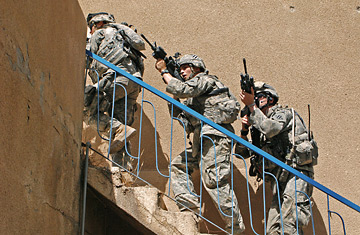
A picture released by the US military, 23 July 2007 shows US Soldiers from 1st Battalion, 30th Infantry Regiment, 2nd Brigade Combat Team, 3rd Infantry Division clearing a house in Baghdad.
Soldiers of the 3rd Infantry Division are digging into an area where American troops have had little presence in the four years since the U.S. invasion. Madain hugs the Tigris River about 20 miles southeast of Baghdad. Its relatively small population once made it an afterthought for the over-stretched American units in and around Baghdad. Now, with the troop surge under way in Baghdad, the U.S. hopes that an increased presence in places like Madain will deny insurgents and militiamen safe havens on the outskirts of the capital.
And this new territory for the Army also brings something of a new experience for the soldiers of 1-15 Infantry. Many of these men are in Iraq for their second or third tour of duty. But the new counter-insurgency doctrine of Gen. David Petraeus, the top American commander in Iraq, means American reinforcements are not simply driving through the area on excursions from large bases; they have set up several combat outposts where the focus is forging relationships with the community.
The move from a few massive bases onto smaller, more numerous combat outposts means many soldiers are going without amenities they got used to on previous trips. Air-conditioned trailers shared between two roommates have given way to tents where the AC often can't compete with 120-degree heat. Cavernous dining halls serving ice cream and made-to-order sandwiches have been replaced by reheated meals eaten outside under camouflage netting. Sgt. Raymond Salgado, 22, said that the bases on his first two deployments had "swimming pools and Burger Kings." He was often too busy to use them, but, he joked, "It was good seeing 'em when we got back from missions."
There are more strategic differences, of course, between the pre- and post-Petraeus eras. Lieutenant-Colonel Jack Marr, who commands 1-15, was stationed outside Fallujah with the 82nd Airborne in 2003 and early 2004. Back then the immediate problem for American forces was the Sunni insurgency. Four years later sectarian divisions in Iraqi society and the mainly Shi'a Iraqi security forces are largely driving the conflict. Marr, a 20-year Army veteran, confronts that problem with the heavily Shi'ite police unit he works with in this dusty farming community 20 miles southeast of Baghdad. "It is difficult to get people to reconcile when they can't get past 'the National Police are Shi'a and I'm not,'" he said.
There is little he can do at ground level to change the National Police — its recruiting and staffing are handled in Baghdad by the Shi'ite-dominated Ministry of Interior. "What's the long-term goal for what they're going to do with those guys?" Marr asked. "I don't really know."
1-15 has had better success implementing the American side of the strategy. "We came in whole hog under the new counter-insurgency doctrine," Marr said. He added that with a more engaged American presence in the area, tensions between Sunnis and Shi'ites have eased. That assessment is seconded by soldiers like Specialist Benjamin Block, 24. He served two tours in Iraq with the Marine Corps before joining the Army last July. His final trip with the Marines was as part of the unit that took over for Marr's 82nd Airborne in Fallujah. "The area around Fallujah wasn't really secure," Block said. "Wherever we were at, it was safe. But there weren't enough of us to cover that amount of ground."
Even with the dramatic increase in American forces there are still areas where 1-15 has trouble maintaining a constant presence. But Block said there was no comparison between Fallujah in 2004 and his current assignment. "This one's a lot quieter," he said. "Our area of operation is much more secure." Sgt. Salgado agrees. On his last deployment, in volatile Diyala province, Salgado said his unit "got hit with IEDs [improvised explosive devices, that is, roadside bombs] on a daily basis." Since returning to Iraq in April the unit has found a couple of roadside bombs before they went off, and suffered no casualties from them. "In [2005] I lost a couple soldiers that were very close to me," he said. "But that hasn't happened on this deployment, and I hope to God it ain't gonna happen."
